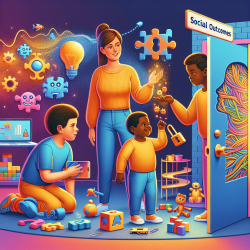Understanding Depression: How Race, Gender, and SES Intersect
As practitioners in the field of speech-language pathology and online therapy, understanding the nuanced factors that contribute to mental health issues such as depression is crucial. The research article "Social Determinants of Depression: The Intersections of Race, Gender, and Socioeconomic Status" by Shervin Assari provides valuable insights into how these factors interact to affect mental health outcomes. This blog will explore the findings of this research and discuss how practitioners can use these insights to enhance their practice and improve outcomes for children.
Key Findings from the Research
The study, which analyzed data from the National Survey of American Life, focused on the separate, additive, and multiplicative effects of race, gender, and socioeconomic status (SES) on the risk of major depressive episodes (MDE) among American adults. The findings revealed several important insights:
- Race and household income, but not gender, education, employment, or marital status, were significantly associated with 12-month MDE.
- Gender interacted with the effects of income on MDE, indicating that the protective effect of household income is more significant for women than for men.
- High income was protective for White women, while education was protective for African American women. Conversely, high income became a risk factor for African American men when other SES indicators were controlled.
Implications for Practitioners
Understanding these intersections is vital for practitioners aiming to provide effective online therapy services. Here are some ways to apply these findings:
- Personalize Interventions: Recognize that the effects of SES on mental health can vary significantly based on race and gender. Tailor interventions to address these specific needs and contexts.
- Focus on Education: For African American women, education is a protective factor. Encourage educational opportunities and support for this group as part of a comprehensive mental health strategy.
- Address Income Disparities: While high income is generally protective, it can be a risk factor for African American men. Understand the broader context of income, including potential stressors associated with upward mobility and discrimination.
Encouraging Further Research
While this study provides valuable insights, it also highlights the need for further research to explore the complex interactions between race, gender, and SES in mental health. Practitioners are encouraged to engage with ongoing research and contribute to the growing body of knowledge in this area.
To read the original research paper, please follow this link: Social Determinants of Depression: The Intersections of Race, Gender, and Socioeconomic Status.










